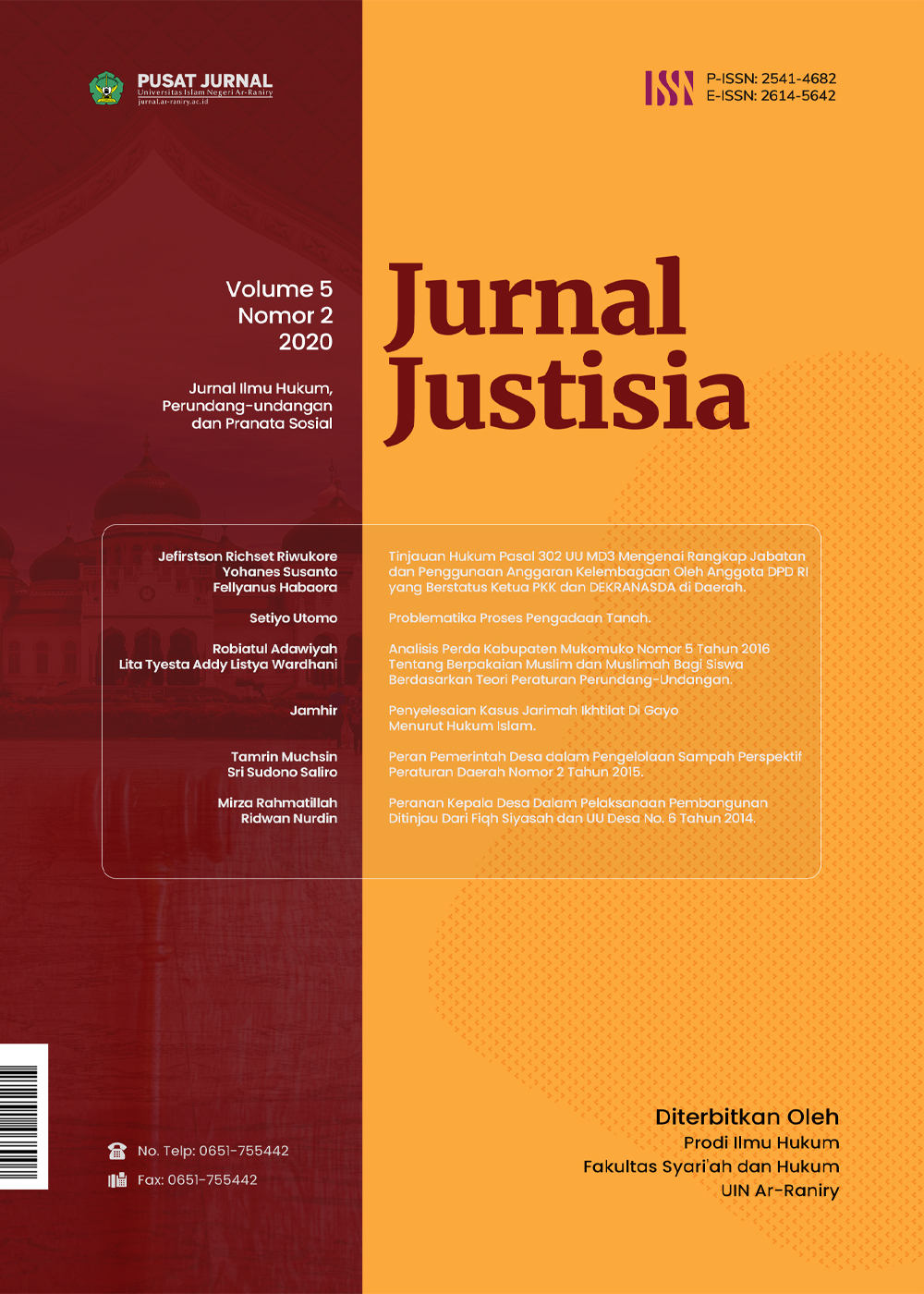Peran Pemerintah Desa dalam Pengelolaan Sampah Perspektif Peraturan Daerah Nomor 2 Tahun 2015 Tentang Pengelolaan Sampah
DOI:
https://doi.org/10.22373/justisia.v5i2.8455Abstract
The purpose of this study was to determine the role of the Sepuk Tanjung Village Government in waste management, and to determine the inhibiting factors for implementing the government's role. When the amount of waste increases, it will cause problems that can endanger humans, both health and the environment. Therefore, it is important to involve the village government as the government that is closest to the people. This research method uses empirical research methods with a statutory approach, to obtain data, researchers conducted observations and interviews with the village government and the community using purposive sampling. The results of the study reveal that the role of the village government is in accordance with Article 11 of Regional Regulation Number 2 of 2015 concerning Waste Management. As for the inhibiting factors, namely, the community factor, the infrastructure factor and the village government factor.
References
Arafat, Jumrotul. “Implementasi Kebijakan Pemerintah Desa Dalam Pengelolaan Sampah Untuk Meningkatkan Pendapatan Asli Desa Dalam Perspektif Ekonomi Islam (Studi pada BUMD Desa Kuta Dalom).” Skripsi, UIN Raden Intan Lampung, 2018.
Arif Zulkifli. Dasar-Dasar Ilmu Lingkungan. Jakarta: Salemba Teknika, 2014.
Badan Pusat Statistik. Kabupaten Sambas Dalam Angka. Sambas, 2016.
Dharma Putra, I Kadek Agus Wira. “Kesadaran Hukum Dalam Pelaksanaan Pengelolaan Sampah Oleh Desa Pakraman Padangtegal Kecamatan Ubud Kabupaten Gianyar.” Skripsi, Fakultas Hukum Universitas Udayana, 2018.
Mahyudin, Rizqi Puteri. “Kajian Permasalahan Pengelolaan Sampah dan Dampak Lingkungan di TPA (Tempat Pemrosesan Akhir).” JUKUNG: Jurnal Teknik Lingkungan Vol. 3 No. 1: 66-74 (2017).
Mohammad Erdi Ferdiansyah, dan Arsiyah. “Peran Pemerintah dan Kader Masyarakat Dalam Pemberdayaan Masyarakat Untuk Pengelolaan Sampah.” Jurnal Kebijakan dan Manajemen Publik Volume 2, no. Nomor 2, September (2014): pp 191-204.
Nugraha, I Made Sugiarta. “Pelaksanaan Peraturan Daerah Kota Denpasar Nomor 3 Tahun 2015 Tentang Pengelolaan Sampah.” Jurnal Ilmu Hukum Program Pascasarjana Universitas Udayana Volume 05, no. 04 (2017).
Peraturan Daerah Kabupaten Sambas Nomor 2 Tahun 2015 Tentang Pengelolaan Sampah, Pub. L. No. Lembaran Daerah Kabupaten Sambas Tahun 2015 Nomor 4 (2015).
Prastiyo. “Peran Pemerintah Dalam Pengelolaan Sampah Di Kecamatan Tanjungpinang (Studi Evaluasi Kebijakan Di Kelurahan Batu IX).” Skripsi, Universitas Maritim Raja Alihaji Tanjungpinang, 2016.
Qodriyatun, Sri Nurhayati. “Bentuk Lembaga Ideal Dalam Pengelolaan Sampah di Daerah (Studi di Kota Malang dan Kabupaten Gianyar).” Jurnal Aspirasi Vol. 6, No. 1, Juni (2015): 13–26.
Sahil, Jailan, Mimien Hanie Irawati Al Muhdar, dan dkk.. “Sistem Pengelolaan dan Upaya Penanggulangan Sampah di Kelurahan Dufa-Dufa Kota Ternate.” Jurnal BIO-edukasi Vol. 4, No. 2. Maret (2016): 478–87.
Sa’id, E.G. Sampah Masalah Kita Bersama. Jakarta: Madiyatama Sarana Perkasa, 1998.
Tri Sukrorini, dan Sri Budiastuti, dkk. “Kajian Dampak Timbunan Sampah Terhadap Lingkungan di Tempat Pembuangan Akhir Putri Cempo Surakarta.” Jurnal EKOSAINS Volume 6, no. Nomor 3, Nopember (2014): pp 56-70.
Undang-Undang Republik Indonesia Nomor 6 Tahun 2014 Tentang Desa, Pub. L. No. Lembaran Negara Republik Indonesia Tahun 2014 Nomor 7 (2014).
Undang-Undang Republik Indonesia Nomor 18 Tahun 2008 Tentang Pengelolaan Sampah (2008).
Waluyo, Bambang. Penelitian Hukum Dalam Praktek. Jakarta: Sinar Grafika, 2002.
Wawancara. Bapak Jamhur Selaku Kepala Desa Sepuk Tanjung, 2020.
———. Bapak Jovi Selaku Kasi Pelayanan dan Kesra Desa Sepuk Tanjung, 2020.
———. Bapak Wahyu Firmansyah Selaku Sekretaris Desa Sepuk Tanjung, 2020.
Downloads
Published
Issue
Section
License
The Authors submitting a manuscript do so on the understanding that if accepted for publication, copyright of the article shall be assigned to Jurnal Justisia : Jurnal Ilmu Hukum, Perundang-undangan dan Pranata Sosial, Ar-Raniry State Islamic University, Indonesia as the publisher of the journal.
Jurnal Justisia : Jurnal Ilmu Hukum, Perundang-undangan dan Pranata Sosial right of first publication with the work simultaneously licensed under Creative Commons Attribution-ShareAlike 4.0 International License (CC BY-SA 4.0) that allows others to share (copy and redistribute the material in any medium or format) and adapt (remix, transform, and build upon the material) the work for any purpose, even commercially with an acknowledgment of the work's authorship and initial publication in Jurnal Justisia : Jurnal Ilmu Hukum, Perundang-undangan dan Pranata Sosial. Authors are able to enter into separate, additional contractual arrangements for the non-exclusive distribution of the journal's published version of the work (e.g., post it to an institutional repository or publish it in a book), with an acknowledgment of its initial publication in Jurnal Justisia : Jurnal Ilmu Hukum, Perundang-undangan dan Pranata Sosial. Authors are permitted and encouraged to post their work online (e.g., in institutional repositories or on their website) prior to and during the submission process, as it can lead to productive exchanges, as well as earlier and greater citation of published work (See The Effect of Open Access).

